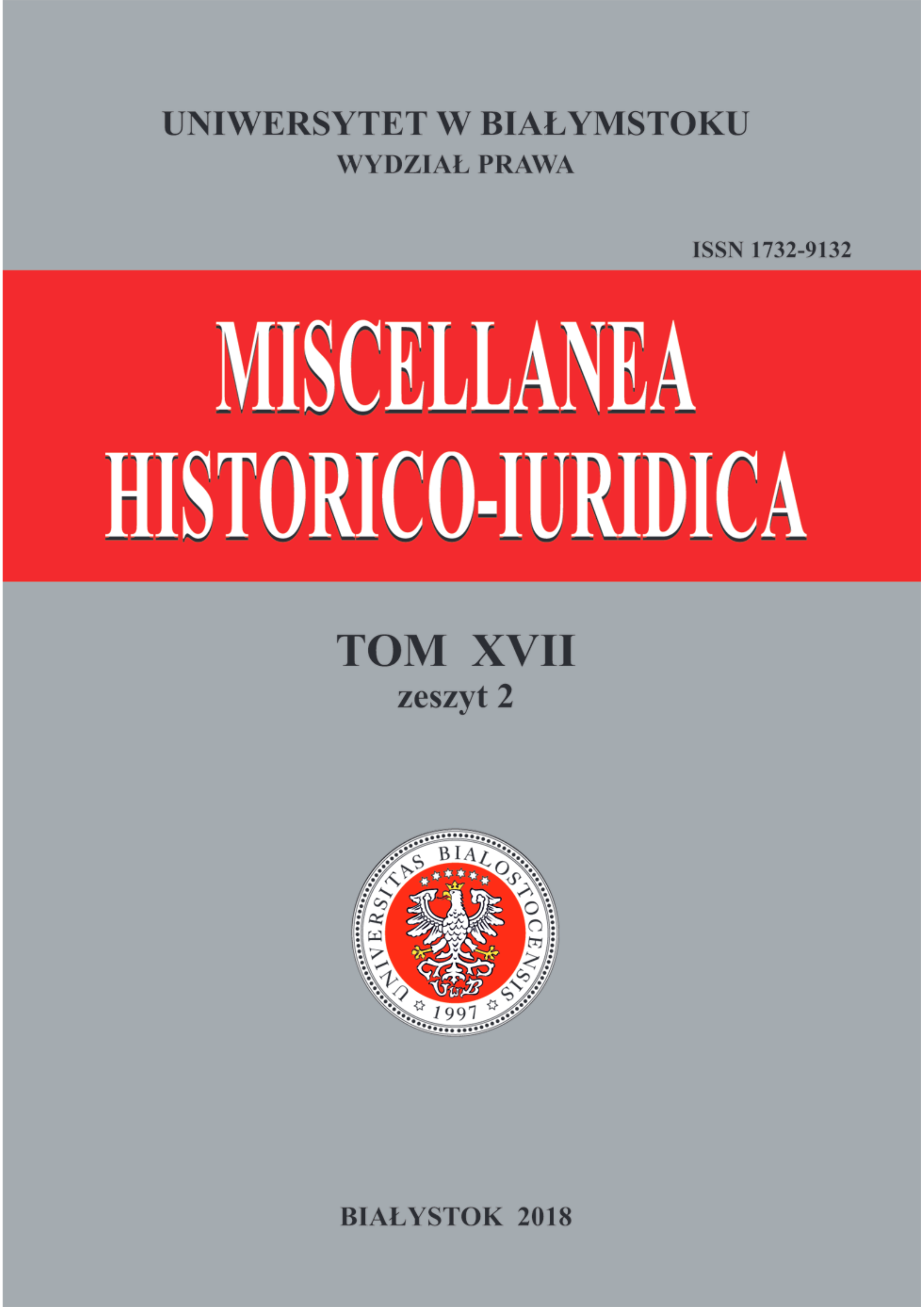Gaius’ Concept of The Law of Nations (Ius Gentium) and Natural Law (Ius Naturale)
Keywords:
classical Roman law, ius gentium, ius naturale, ius civile, Roman jurist Gaius, Institutes of Gaius, Roman jurisprudenceAbstract
The paper, after a brief presentation of the classical Roman jurist Gaius and his most important and best known work, Gai Institutionum commentarii quattuor, presents and analyzes his legal texts concerning mainly ius gentium and its relationship to ius naturale. At the beginning of his textbook, this Roman jurist distinguishes only two types of law: civil law – ius civile and the law of nations – ius gentium (Gai Inst. 1, 1). Gaius mentions the law of nations (ius gentium) explicitly in the above mentioned fragment in a way that he relates it to “natural ratio” – natural order or natural reason. Gaius defined the concept of ius gentium two centuries after Cicero. Unlike Cicero who was more a philosopher than a lawyer and perceived “ius gentium” mainly in an abstract sense, Gaius came up with the concrete concept of ius gentium, which was clearly separated from the concept of ius civile. Ius gentium is the law which is common for all nations. On the other hand ius civile is the law which concerns only Roman citizens. Ius gentium is the law which obliges both Romans and foreigners, because its basis is “naturalis ratio”. In addition, Gaius, in characterizing ius gentium, gives attention to two elements: a) any standards apply to all nations; b) or standards come out of natural reason (naturalis ratio). Gaius in this way presented two perspectives on one and the same ius gentium which are intrinsically and therefore necessarily linked. The first point of view is concrete and the second one is abstract. In other words Gaius presented some legal institutions which belong to the area of ius gentium from the concrete point of view, the other ones from the abstract point of view, which is based on the so-called “naturalis ratio”. As far as the category of ius naturale is concerned, Gaius, in terms of content, identified it with ius gentium. So ius gentium differs from ius naturale only on the basis of a point of view, which individual standards or legal institutions are expressed through. If legal standards are expressed from the concrete point of view (i.e. in standards there is an explicit mention that they apply to all nations), then they can be included in the category of ius gentium. If they are formulated from the abstract point of view (i.e. in standards there is a mention of their origin from “naturalis ratio”), they can beincluded in the category of natural law.
References
Albertario E., Studi di diritto romano III. Obbligazioni, Milano 1936.
Alberti A., Ricerche su alcune glosse alle Istituzioni di Gaio, Milano 1935.
Archi G.G., Lex e natura nelle Istituzioni di Gaio, [w:] Festschrift fűr Werner Flume zum 70. Geburstag, red. H.H. Jakobs, B. Knobbe-Keuk, E. Picker, J. Wilhlm, Köln 1978.
Bastit M., La diversité dans les Institutes de Gaius, “Archives de philosophie du droit” 1978, 23.
Bělovský P., Přirozené právo v díle m. Tullia cicerona, „Právněhistorické studie” 2009, 40.
Betti E., Sul significato di “contrahere” in Gaio, San Severino-Marche 1912.
Bonfante P., Storia del diritto romano, Vol. I, Roma 1959.
Brtko R., Filozofickoprávne východiská prirodzeného práva v klasickom a justiniánskom období rímskeho práva, Bratislava 2013.
Brtko R., Korene prirodzeného práva v starovekom Grécku, [w:] Ius romanum schola sapientiae. Pocta Petrovi Blahovi k 70. narodeninám, red. P. Mach, M. Nemec, M. Pekarík, Trnava 2009.
Burdese A., Il concetto di ius naturale nel pensiero della giurisprudenza classica, “Rivista italiana per le scienze giuridiche” 1954, 8.
Gaius, Učebnice práva ve čtyřech knihách, transl. J. Kincl, Plzeň 2007.
Kasser M., Ius gentium, Köln-Weimar-Wien 1993.
Kincl J., Gaius.Učebnice práva vo čtyřech knihách, Plzeň 2007.
Kincl J., urfus V., Skřejpek M., Římské právo, Praha 1995.
Kodrebski J., Gaius i Pomponius jako nauczyciele prawa rzymskiego, “Zeszyty Naukowe uniwersytetu łódzkiego” 1976, 108.
Krüger P., Geschichte der Quellen und litt. des römischen Rechts, 2. ed., München – Leipzig 1912.
Lombardi G., Sul concetto di “ius gentium”, Roma 1947.
Lombardi G., Ricerche in tema di “ius gentium”, Pubblicazioni dell ́Istituto di diritto romano dei diritti dell ́oriente mediteraneo e di storia del diritto – XXI, Roma 1946.
Maschi C.A., La concezione naturalistica del diritto e degli instituti giuridici romani, Milano 1937.
Nardi E., Istituzioni di diritto romano. Testi 1, Milano 1973.
Perozzi S., Interpretazione di Gaio 3, 119a, [w:] Studi in onore Pietr Bonfante nel Xl anno d ́insegmamento, Vol. I, Milano 1930.
Pizzorni R., Il diritto naturale dalle origini a s. Tomasso d ́aquino, 2 ed., Roma 1950.
Pringsheim F., Siber Heinrich, Naturalis obligatio, Besprochen von Fritz Pringsheim, “Zeitschrift der Savigny-Stiftung” 1926, 46.
Roby H.G., An Introduction to the Study of Justinian ́s Digest. Containing an Account of its Composition and of the Jurists Used or Referred to Therein, Together with a Full Comentary on One Title (de Usufructu), Cambridge 2010.
Strauss L., Natural Right and History, Chicago – London 1953.
Talamanca M., Istituzioni di diritto romano,Milano 1990.
Vážný J., Naturalis obligatio, [w:] Studi Bonfante IV, Milano 1930.
Wagner H., Studien zur Allgemeinen Rechtslehre des Gaius. Ius Gentium und Ius Naturale in ihrem Verhältnis zum Ius civile, Zutphen, Holland 1978.







